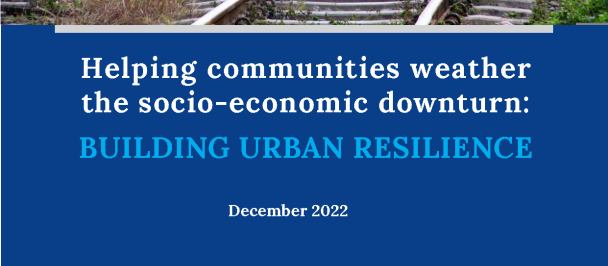An experimental global index offers a new measurement of human progress that illustrates the challenge of tackling poverty and inequality while easing planetary pressure.
New York, 16 December 2020 – The COVID-19 pandemic is the latest crisis facing the world, but unless humans release their grip on nature, it won’t be the last, according to a new report by the United Nations Development Programme (UNDP), which includes a new experimental index on human progress that takes into account countries’ carbon dioxide emissions and material footprint.
The report lays out a stark choice for world leaders - take bold steps to reduce the immense pressure that is being exerted on the environment and the natural world, or humanity’s progress will stall.
“Humans wield more power over the planet than ever before. In the wake of COVID-19, record- breaking temperatures and spiraling inequality, it is time to use that power to redefine what we mean by progress, where our carbon and consumption footprints are no longer hidden,” said Achim Steiner, UNDP Administrator.
“As this report shows, no country in the world has yet achieved very high human development without putting immense strain on the planet. But we could be the first generation to right this wrong. That is the next frontier for human development,” he said.
The report argues that as people and planet enter an entirely new geological epoch, the Anthropocene or the Age of Humans, it is time to for all countries to redesign their paths to progress by fully accounting for the dangerous pressures humans put on the planet, and dismantle the gross imbalances of power and opportunity that prevent change.
To illustrate the point, the 30th anniversary edition of the Human Development Report, The Next Frontier: Human Development and the Anthropocene, introduces an experimental new lens to its annual Human Development Index (HDI).
By adjusting the HDI, which measures a nation’s health, education, and standards of living, to include two more elements: a country’s carbon dioxide emissions and its material footprint, the index shows how the global development landscape would change if both the wellbeing of people and also the planet were central to defining humanity’s progress.
With the resulting Planetary-Pressures Adjusted HDI – or PHDI - a new global picture emerges, painting a less rosy but clearer assessment of human progress. For example, more than 50 countries drop out of the very high human development group, reflecting their dependence on fossil fuels and material footprint while countries like Costa Rica, Moldova, and Panama move upwards by at least 30 places, recognizing that lighter pressure on the planet is possible.
While Myanmar marginally improved its HDI rank to 147 in 2019 from 148 in 2018, out of 189 countries and territories, when measured against PHDI, it moved up by 3 places with 0.9 percent lower score than its HDI in the latest report.
“The Human Development Report is an important product by the United Nations. In a time where action is needed, the new generation of Human Development Reports, with greater emphasis on the defining issues of our time such as climate change and inequalities, helps us to steer our efforts towards the future we want,” said Stefan Löfven, Prime Minister of Sweden, host country of the launch of the report.
The next frontier for human development will require working with and not against nature, while transforming social norms, values, and government and financial incentives, the report argues.
For example, new estimates project that by 2100 the poorest countries in the world could experience up to 100 more days of extreme weather due to climate change each year- a number that could be cut in half if the Paris Agreement on climate change is fully implemented.
And yet fossil fuels are still being subsidized: the full cost to societies of publicly financed subsidies for fossil fuels - including indirect costs - is estimated at over US$5 trillion a year, or 6.5 percent of global GDP, according to International Monetary Fund figures cited in the report.
“Development choices of the past have systematically undervalued the environment, posing human progress and sustainability as conflicting pursuits” said Kanni Wignaraja, UN Assistant Secretary-General and UNDP Regional Director for Asia and the Pacific.
Reforestation and taking better care of forests could alone account for roughly a quarter of the pre-2030 actions we must take to stop global warming from reaching two degrees Celsius above preindustrial levels. While Myanmar’s planetary pressures are relatively low, the country has nevertheless recognized the need to address negative externalities of its economic development path including through the 10-year “Myanmar Reforestation and Rehabilitation Programme launched in 2018 to address some types of deforestation and forest degradation, said Dawn Del Rio, Deputy Resident Representative, UNDP, Myanmar.
How people experience planetary pressures is tied to how societies work, says Pedro Conceição, Director of UNDP’s Human Development Report Office and lead author of the report, and today, broken societies are putting people and planet on a collision course.
Inequalities within and between countries, with deep roots in colonialism and racism, mean that people who have more capture the benefits of nature and export the costs, the report shows. This chokes opportunities for people who have less and minimizes their ability to do anything about it.
For example, land stewarded by indigenous peoples in the Amazon absorbs, on a per person basis, the equivalent carbon dioxide of that emitted by the richest 1 percent of people in the world. However, indigenous peoples continue to face hardship, persecution and discrimination, and have little voice in decision-making, according to the report.
And discrimination based on ethnicity frequently leaves communities severely affected and exposed to high environmental risks such as toxic waste or excessive pollution, a trend that is reproduced in urban areas across continents, argue the authors.
According to the report, easing planetary pressures in a way that enables all people to flourish in this new age requires dismantling the gross imbalances of power and opportunity that stand in the way of transformation.
The Government of Myanmar through the Myanmar Sustainable Development Plan (2018-2030) has committed itself to a climate-sensitive development pathway. Subsequently, this has been complemented by the recently launched new National Environmental Policy and Myanmar Climate Change Policy in 2019. Cumulatively, the policy commitments have set out a vision for Myanmar as a climate-resilient, low-carbon society for the well-being of present and future generations which now need to be operationalized systematically. In this regard, Daw Aung San Suu Kyi, State Counsellor of the Republic of the Union of Myanmar, in her statement made recently at the virtual Climate Ambition Summit, has reiterated Myanmar’s commitment to submit its Nationally Determined Contribution (NDC) by the end of 2020 and highlighted the targeted reduction of over 243 million tons of CO2 by increasing the share of renewable energy to 39% and reducing the net emission from the forestry sector by 25%.
Public action, the report argues, can address these inequalities, with examples ranging from increasingly progressive taxation, to protecting coastal communities through preventive investment and insurance, a move that could safeguard the lives of 840 million people who live along the world’s low elevation coastlines. But there must be a concerted effort to ensure that actions do not further pit people against planet.
To learn more about the 2020 Human Development report and UNDP’s analysis on the experimental Planetary Pressures-Adjusted HDI, visit http://hdr.undp.org/en/2020-report
###
UNDP is the leading United Nations organization fighting to end the injustice of poverty, inequality, and climate change. Working with our broad network of experts and partners in 170 countries, we help nations to build integrated, lasting solutions for people and planet. Learn more at undp.org or follow at @UNDP.
Media Contacts:
Human Development Report Office | Anna Ortubia, Communications Specialist | anna.ortubia@undp.org
UNDP | Si Thu Soe Moe, Communications Analyst | si.thu.soe.moe@undp.org

 Locations
Locations



